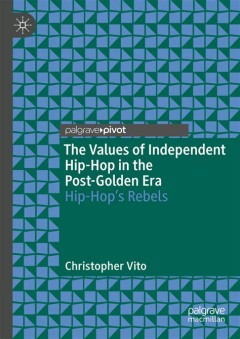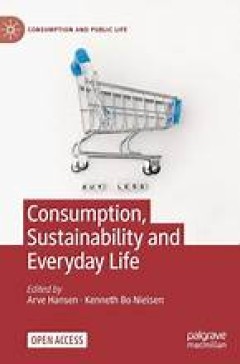Filter by

Reconstructions of Gender and Information Technology: Women Doing IT for Them…
This open access book explores what makes women decide to pursue a career in male-dominated fields such as information technology (IT). It reveals how women experience gendered stereotypes but also how they bypass, negotiate, and challenge such stereotypes, reconstructing gender-technology relations in the process. Using the example of Norway to illuminate this challenge in Western countries, t…
- Edition
- -
- ISBN/ISSN
- 9789819951871
- Collation
- XV, 133
- Series Title
- -
- Call Number
- -

The Values of Independent Hip-Hop in the Post-Golden Era
Utilizing a mixed-methods approach, this book uncovers the historical trajectory of U.S. independent hip-hop in the post-golden era, seeking to understand its complex relationship to mainstream hip-hop culture and U.S. culture more generally. Christopher Vito analyzes the lyrics of indie hip-hop albums from 2000-2013 to uncover the dominant ideologies of independent artists regarding race, cla…
- Edition
- 1
- ISBN/ISSN
- 9783030024819
- Collation
- XV, 184 hlm,: ill, lamp;
- Series Title
- -
- Call Number
- -

The Nation Form in the Global Age
This open access book argues that contrary to dominant approaches that view nationalism as unaffected by globalization or globalization undermining the nation-state, the contemporary world is actually marked by globalization of the nation form. Based on fieldwork in Africa, Asia, Europe and the Middle East and drawing, among others, on Peter van der Veer’s comparative work on religion and nat…
- Edition
- 1
- ISBN/ISSN
- 978-3-030-85580-2
- Collation
- oer.unej.ac.id
- Series Title
- Global Diversities
- Call Number
- 306

Consumption, Sustainability and Everyday Life
This open access book seeks to understand why we consume as we do, how consumption changes, and why we keep consuming more and more, despite the visible damage we are doing to the planet. The chapters cover both the stubbornness of unsustainable consumption patterns in affluent societies and the drivers of rapidly increasing consumption in emerging economies. They focus on consumption patterns …
- Edition
- 1
- ISBN/ISSN
- 978-3-031-11069-6
- Collation
- oer.unej.ac.id
- Series Title
- Consumption and Public Life
- Call Number
- 306

Systems Mapping
This open access book explores a range of new and older systems mapping methods focused on representing causal relationships in systems. In a practical manner, it describes the methods and considers the differences between them; describes how to use them yourself; describes how to choose between and combine them; considers the role of data, evidence, and stakeholder opinion; and describes how t…
- Edition
- 1
- ISBN/ISSN
- 978-3-031-01919-7
- Collation
- -
- Series Title
- -
- Call Number
- XVII, 186

Health Crises and Media Discourses in Sub-Saharan Africa
This is an open access book which brings together leading scholars and critical discourses on political, economic, legal, technological, socio-cultural and systemic changes and continuities intersecting media and health crises in Sub-Saharan Africa. The volume extensively discusses COVID-19 but it also covers other epidemics, such as malaria, HIV/AIDS as well as “silent” health crises such …
- Edition
- 1
- ISBN/ISSN
- 978-3-030-95100-9
- Collation
- -
- Series Title
- -
- Call Number
- XVIII, 283

Health Dimensions of COVID-19 in India and Beyond
This open access book addresses the multiple health dimensions posed by the COVID-19 pandemic in India and other countries including nine in Asia, five in Sub-Saharan Africa, and New Zealand. It explores the impact of the pandemic on mental health, sexual and reproductive health and rights, health financing, self-care, and vaccine development and distribution. The contributing authors discuss i…
- Edition
- 1
- ISBN/ISSN
- -
- Collation
- -
- Series Title
- -
- Call Number
- XXXIV, 355

Die Prämedikationsambulanz
In diesem Open-Access-Buch beschäftigt sich der Universitätsmediziner, Manager und Gesundheitswissenschaftler Sandro Lorenz mit der Zufriedenheit von Patientinnen und Patienten in der Prämedikationsambulanz einer großen deutschen Universitätsklinik. Ein zusätzlicher Fokus liegt auf der präoperativen Angst im Vorfeld einer Narkose bzw. Operation. Der Autor plädiert dafür, dass diese zun…
- Edition
- 1
- ISBN/ISSN
- 978-3-658-39259-8
- Collation
- -
- Series Title
- -
- Call Number
- XXIV, 257

Robots in Care and Everyday Life
- Edition
- 1
- ISBN/ISSN
- 978-3-031-11447-2
- Collation
- -
- Series Title
- SpringerBriefs in Sociology
- Call Number
- IX, 130
- Edition
- 1
- ISBN/ISSN
- 978-3-031-11447-2
- Collation
- -
- Series Title
- SpringerBriefs in Sociology
- Call Number
- IX, 130

Die Prämedikationsambulanz Analyse der Prozessqualität, Patientenzufrieden…
In diesem Open-Access-Buch beschäftigt sich der Universitätsmediziner, Manager und Gesundheitswissenschaftler Sandro Lorenz mit der Zufriedenheit von Patientinnen und Patienten in der Prämedikationsambulanz einer großen deutschen Universitätsklinik. Ein zusätzlicher Fokus liegt auf der präoperativen Angst im Vorfeld einer Narkose bzw. Operation. Der Autor plädiert dafür, dass diese zun…
- Edition
- 1
- ISBN/ISSN
- 978-3-658-39259-8
- Collation
- -
- Series Title
- Social Science and Law
- Call Number
- XXIV, 257
 Computer Science, Information & General Works
Computer Science, Information & General Works  Philosophy & Psychology
Philosophy & Psychology  Religion
Religion  Social Sciences
Social Sciences  Language
Language  Pure Science
Pure Science  Applied Sciences
Applied Sciences  Art & Recreation
Art & Recreation  Literature
Literature  History & Geography
History & Geography